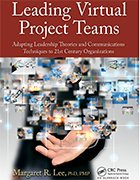
Virtual leadership styles: transformational vs. transactional
The differences between transformational and transactional leadership styles matter for virtual teams. Leaders and managers should understand each approach's key characteristics.
There's no one-size-fits-all leadership style for managing remote teams, but virtual project managers have options. Many traditional management styles don't work for remote work environments. Turning to new forms, such as e-leadership, may help.
E-leadership takes place in non-traditional virtual business environments dependent on information technology, according to corporate trainer, instructional designer and project manager Margaret R. Lee in her book Leading Virtual Project Teams: Adapting Leadership Theories and Communications Techniques to 21st Century Organizations, 2nd Edition. Information technology is only one aspect of e-leadership.
The e-leadership model involves several traditional and non-traditional approaches, Lee wrote. Two specific forms include transformational leadership and transactional leadership.
Transformational leadership inspires employees to contribute, Lee wrote. In this model, leaders motivate workers by clearly identifying objectives and setting the project's vision. This leadership style urges employees to use collaboration, collective problem solving and creativity to achieve goals. In one case study -- detailed in the following excerpt -- teams led by transformational leaders exhibited higher-level thinking and were more likely to show ethical thinking.
A transactional leader is more concrete, closely monitoring employees and setting clear expectations based on a reward and punishment system. Employee collaboration and innovation aren't necessary for this leadership style. The same case study highlighted that teams led by a transactional leader were more likely to opt for using copyrighted material.
Still, the two styles have a role in management and often coexist alongside other e-leadership approaches.
Virtual project environments require a variety of leadership, management and communication styles from e-leaders, Lee wrote. The key to managing an organization's human resources and supervising virtual projects well is understanding where to apply appropriate e-leadership styles.
This excerpt from Chapter 2 of Leading Virtual Project Teams outlines the differences and similarities between transformational and transactional leadership styles for virtual teams as well as gives advice on how to implement each approach.
Transformational and transactional leadership styles
Transformational and transactional leadership characteristics are common management styles for virtual teams. Transformational leaders are defined as leaders who motivate and inspire followers to work. The transformational leader characteristics include the following:
- Leading by example
- Inspiring through articulating vision
- Leading ethically with integrity and optimism
- Showing a willingness to take risks and responsibility to achieve the vision
- Being proactive and confident
Transactional leaders are defined as leaders who encourage followers to complete goals by clearly identifying roles and setting vision, similar to control-related task leadership. In a study to determine virtual team leadership behaviors in projects, the results were divided into five major behaviors closely related to transactional leadership characteristics:
- Ability to provide role and expectation clarity and good communications
- Willingness to work along with the team
- Relationship-building skills
- Ability to lead effective team meetings
- Strong project management
Many e-leadership behaviors can be identified and linked to both transformational and transactional leadership styles. Leaders who inspire goals for virtual teams reflect the transformational-style motivational skills. Providing role and expectation clarity for virtual teams reflects the contingent reward factor of transactional-style leadership.
An interesting study by Kahai and Avolio reviewed the effects of transactional versus transformational leadership styles on virtual groups challenged with the ethics of copying copyrighted software. Transformational leaders attempted to motivate the anonymous virtual team members to aspire to higher-order needs and values and fulfill their personal aspirations, stating that they would learn from their discussion about copying software by working together to arrive at a better conclusion. Transactional leaders attempted to motivate the anonymous virtual team members by highlighting the contractual exchanges involved and emphasizing what results would be derived from the information exchanges on the topic (such as a listing of ideas, completing the task, and getting credit for the discussion). The results showed that the teams working with transformational leaders were more likely to challenge the copying of copyrighted material. Those virtual team members working with the transactional leaders were more in favor of copying the copyrighted software. The transactional leadership led the group toward the contingent reward factor. A contingent reward system is based on meeting specific goals, using frequent reviews to motivate employees toward receiving rewards such as an extra vacation day, monetary bonuses, or other incentives. The transformational leadership led the group toward a higher level of analysis, with verbal accolades, praise, and compliments as effect motivators.
Motivation can be enhanced by providing challenges and recognition, and rewarding responsibility and creativity. Communicating the vision can be achieved through a well-developed project charter, developing emotional buy-in and ownership of the vision within the team, and using the vision to guide and direct the work. Inspiring followers to work and motivating followers to complete goals by clearly identifying roles and setting a vision are skills that can be learned. Training on transformational and transactional leadership skills and when each style is appropriate can provide an opportunity to apply these skills in real work situations. Developing training programs for virtual leaders and virtual project team members may increase team performance. Leaders can be taught skills and leadership techniques that can be most effective in virtual team management.
© Margaret R. Lee 2021. Reprinted with permission of the publisher, CRC Press.







